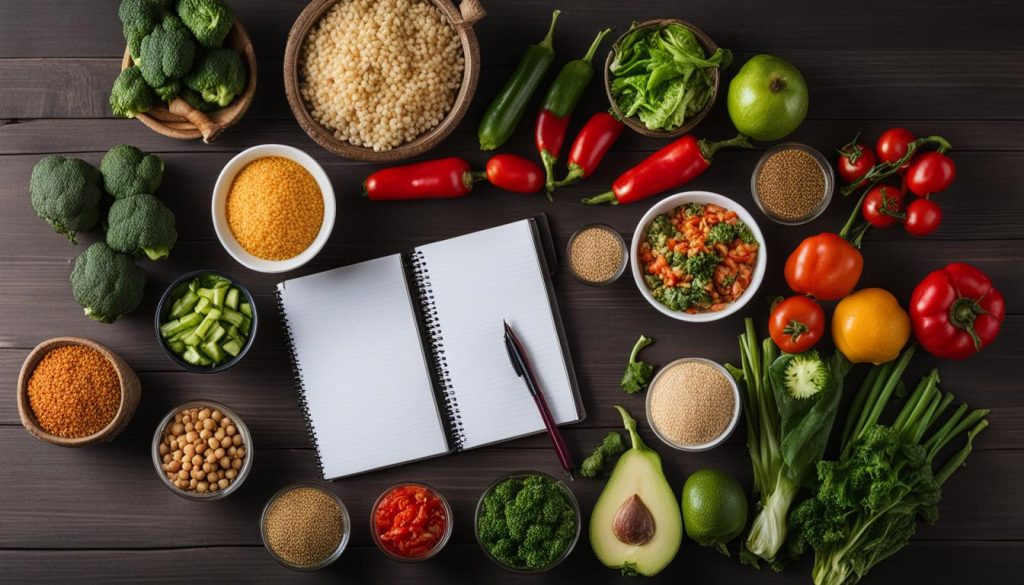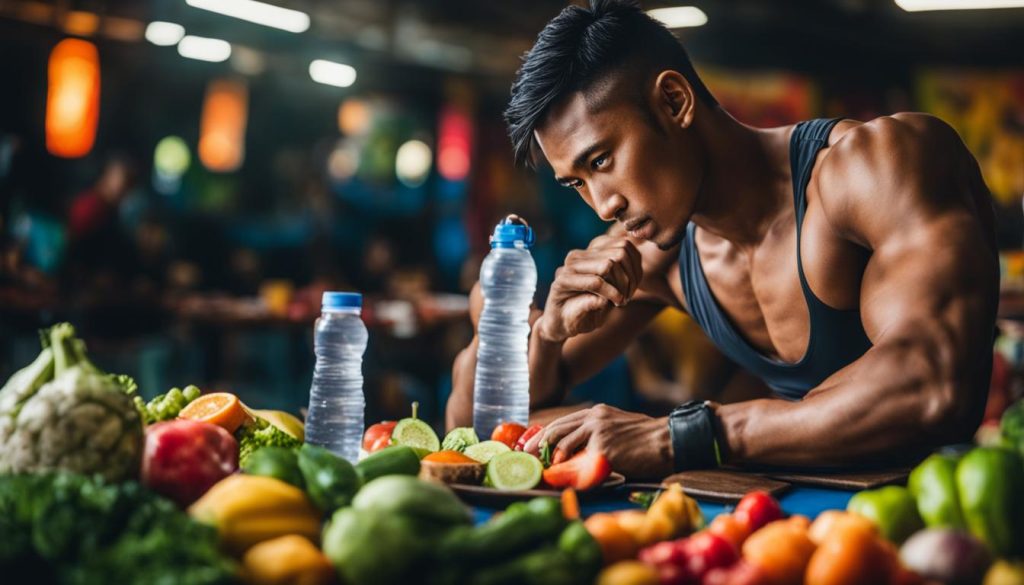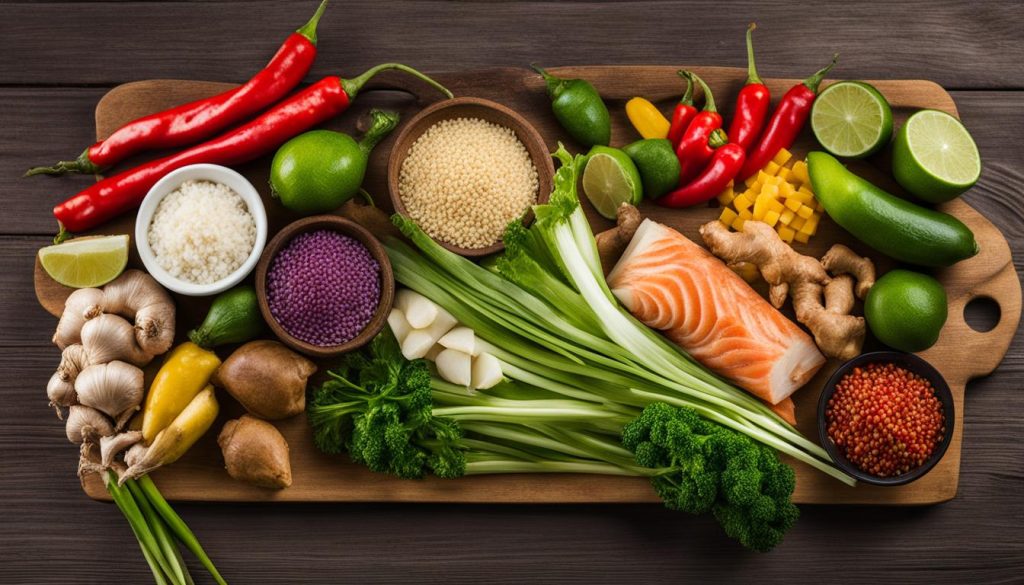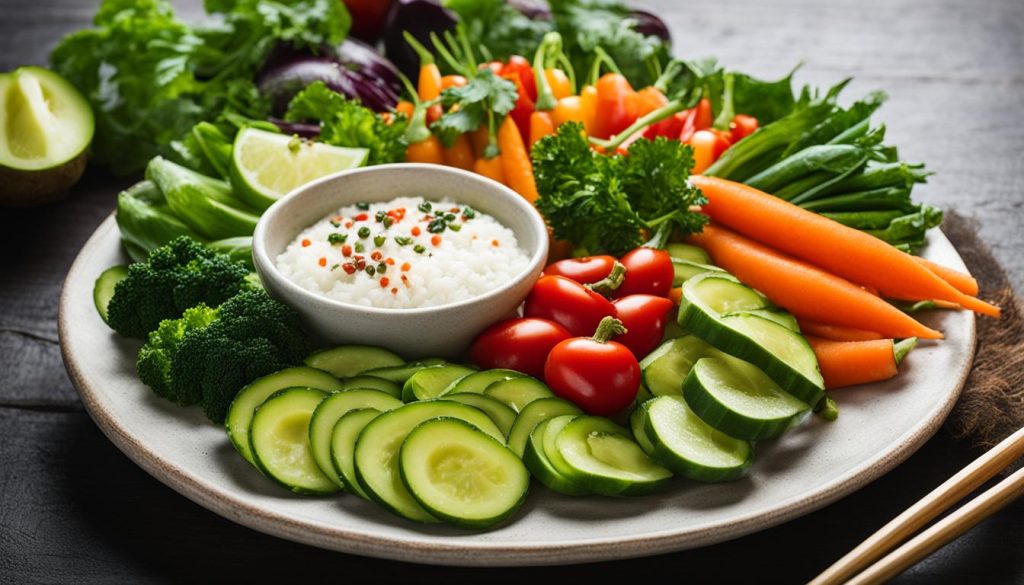When it comes to achieving peak performance in Muay Thai, nutrition plays a vital role. Just like the training regimen, a Muay Thai fighter’s diet requires careful consideration and planning to ensure optimal energy levels, endurance, and strength. In this article, we’ll delve into the world of Muay Thai nutrition, exploring the dietary habits and tips that can help you eat like a Muay Thai fighter and enhance your own performance.
Key Takeaways:
- Eating right is crucial for maximizing performance in Muay Thai.
- Following a balanced and sustainable diet is essential for long-term success.
- Proper meal planning and scheduled eating help maintain consistent energy levels.
- Avoiding processed junk food and focusing on nutrient-dense foods is key.
- Clean eating principles and protein-rich foods support muscle recovery and development.
Why Proper Nutrition Matters for Muay Thai Fighters
Proper nutrition is not just important for overall health, but it plays a crucial role in the performance of Muay Thai fighters. The United World Muay Thai Association (UWMTA) recognizes the significance of nutrition in training and recommends specific dietary guidelines to optimize fighters’ physical and mental capabilities.
Training as a Muay Thai fighter requires intense physical exertion and stamina. The right nutrition provides the necessary fuel and energy to endure rigorous training sessions and matches. A well-balanced diet ensures that fighters have the nutrients they need to maintain muscle mass, support recovery, and enhance performance.
The UWMTA emphasizes the importance of consuming a variety of nutrient-dense foods, including lean proteins, whole grains, fruits, and vegetables. These foods provide essential vitamins, minerals, and antioxidants that contribute to overall health and well-being. By following the nutrition guidelines set by the UWMTA, fighters can maximize their potential in the ring.
Proper nutrition is not just about what fighters eat, but also when and how they eat. Strategic meal planning and scheduled eating ensure that fighters have a steady supply of energy throughout the day. By fueling their bodies at the right times, fighters can optimize their training, recovery, and performance.
Fueling for Training
During training sessions, fighters rely on carbohydrates for immediate energy. Incorporating complex carbohydrates such as whole grains, sweet potatoes, and fruits into their pre-workout meals and snacks can provide sustained energy levels and prevent fatigue. Additionally, protein intake before and after training sessions plays a crucial role in muscle recovery and repair.
Optimizing Recovery
Proper nutrition is equally important for post-workout recovery. Consuming a combination of carbohydrates and protein within the first 30 minutes after training can help replenish glycogen stores and promote muscle repair. This can be achieved through a protein shake or a balanced meal that includes lean protein and healthy carbohydrates.
Hydration
Adequate hydration is often overlooked but is essential for optimal performance. Muay Thai fighters should aim to drink enough water throughout the day to maintain hydration levels during training and matches. Staying hydrated helps regulate body temperature, lubricate joints, and deliver nutrients to muscles.
| Nutrition Tips for Muay Thai Fighters | Benefits |
|---|---|
| Consume lean proteins such as chicken, fish, and tofu | Supports muscle growth and repair |
| Incorporate complex carbohydrates like whole grains and sweet potatoes | Provides sustained energy |
| Eat a variety of fruits and vegetables | Supplies essential vitamins, minerals, and antioxidants |
| Maintain hydration levels by drinking enough water | Regulates body temperature and aids in nutrient delivery |
| Avoid processed and sugary foods | Prevents energy crashes and supports overall health |
Proper nutrition is the foundation for optimal performance in Muay Thai. By fueling your body with the right nutrients, following the dietary guidelines set by the UWMTA, and prioritizing hydration, you can unlock your full potential as a Muay Thai fighter.
Embracing a Long-Term Approach to Healthy Eating
When it comes to fueling your body like a Muay Thai fighter, it’s important to adopt a long-term approach to healthy eating. Instead of relying on short-term diets or quick fixes, focusing on sustainable habits can help optimize your performance and overall well-being as an athlete.
By embracing a balanced and nutritious diet, you can consistently provide your body with the necessary nutrients it needs for optimal performance. This means incorporating a variety of whole foods such as lean proteins, fruits, vegetables, whole grains, and healthy fats into your meals.
It’s also essential to maintain a consistent eating routine that aligns with your training schedule. By planning your meals and snacks in advance, you can ensure you’re properly fueling your body throughout the day. This might involve prepping meals ahead of time or packing snacks that are easy to grab on the go.
In addition to nourishing your body with the right foods, it’s crucial to listen to your body’s hunger and fullness cues. Mindful eating can help you develop a deeper connection with your body and allow you to truly enjoy and savor your meals. By paying attention to your body’s signals, you can ensure you’re eating the right amount of food to support your energy needs.
The Benefits of a Balanced Diet for Muay Thai Fighters
Adopting a balanced diet as a Muay Thai athlete offers numerous benefits. The right combination of macronutrients and micronutrients can help support energy levels, aid in muscle recovery, and enhance overall performance. Here’s a breakdown of the key components of a balanced diet for Muay Thai fighters:
| Macronutrients | Micronutrients |
|---|---|
|
|
By embracing a long-term approach to healthy eating and fueling your body with a balanced diet, you can optimize your performance as a Muay Thai fighter and set yourself up for long-term success in the ring.
Creating a Meal Schedule for Optimal Nutrition

When it comes to fueling your body like a Muay Thai fighter, one of the key factors to consider is your meal schedule. By strategically planning your meals and snacks throughout the day, you can ensure that you are consuming the right balance of nutrients to support your training and optimize your performance.
Meal planning plays a crucial role in providing your body with the fuel it needs to perform at its best. By having a structured meal schedule, you can avoid skipping meals or resorting to unhealthy food choices when hunger strikes. This not only helps to stabilize your energy levels but also ensures that you are consistently meeting your nutritional requirements.
To create an effective meal schedule, start by determining the number of meals and snacks that work best for your body and training routine. Aim to have meals spaced out every 3-4 hours, with snacks in between to keep your energy levels stable.
Sample Meal Schedule for a Muay Thai Fighter:
| Meal | Time |
|---|---|
| Breakfast | 7:00 AM |
| Snack | 10:00 AM |
| Lunch | 12:30 PM |
| Pre-Workout Snack | 3:00 PM |
| Post-Workout Meal | 6:00 PM |
| Dinner | 8:00 PM |
| Evening Snack | 10:00 PM |
Remember, the specific timing of your meals may vary based on your individual preferences and training schedule. It’s important to listen to your body and adjust your meal schedule accordingly.
By creating a meal schedule that works for you, you can ensure that you are consistently providing your body with the nutrients it needs to optimize your performance as a Muay Thai fighter.
Gradual Changes for Sustainable Eating Habits
When it comes to nutrition for Muay Thai fighters, making gradual changes to your eating habits is key to long-term success. Instead of resorting to drastic diets or quick fixes, focus on slowly incorporating healthier food choices and eliminating unhealthy options over time. This approach allows your body to adapt to the changes and ensures sustainable eating habits.
One of the first steps in implementing gradual changes is to start by adding more fruits and vegetables to your meals. These nutrient-dense foods provide essential vitamins and minerals while adding variety to your diet. Aim to include a colorful assortment of fruits and vegetables in each meal to maximize your nutrient intake.
Additionally, gradually swap out processed and sugary foods for whole, unprocessed alternatives. For example, replace sugary drinks with water or herbal tea, and opt for whole grain bread instead of refined white bread. These small changes can have a significant impact on your overall nutrition without feeling restrictive.
Remember, sustainable eating habits are not about depriving yourself or following strict rules. They are about creating a balanced and enjoyable approach to food that nourishes your body and supports your Muay Thai training. By gradually incorporating healthier choices and eliminating unhealthy options, you can fuel your body effectively and enhance your performance in the ring.
Incorporating Gradual Changes
Incorporating gradual changes into your eating habits can be challenging at first, but with a few simple strategies, it can become a seamless part of your routine. Here are some tips to help you get started:
- Set small, achievable goals: Instead of trying to completely overhaul your diet overnight, set realistic goals that you can work towards gradually. For example, aim to have one additional serving of vegetables each day or replace one unhealthy snack with a healthier option.
- Plan your meals: Planning your meals in advance can help you make healthier choices and avoid impulsive decisions. Take the time to create a weekly meal plan and grocery list, including a variety of nutritious foods.
- Experiment with new recipes: Trying out new recipes can make the transition to healthier eating more enjoyable. Look for healthy alternatives to your favorite dishes or explore new cuisines that emphasize fresh, whole ingredients.
- Seek support: Surrounding yourself with a supportive community can help you stay motivated and accountable. Consider joining a cooking class or connecting with other Muay Thai fighters who are also focused on improving their nutrition.
By incorporating these gradual changes and adopting a sustainable approach to eating, you can fuel your body with the nutrients it needs to excel in your Muay Thai training and matches.
The Importance of Moderation in Diet
When it comes to fueling your body like a Muay Thai fighter, moderation is key. While it’s important to prioritize nutritious foods, allowing yourself occasional indulgences can help you maintain a balanced and sustainable diet. By practicing portion control and being mindful of your food choices, you can enjoy your favorite treats without compromising your overall nutrition.
Moderation not only allows for flexibility in your diet but also helps you develop a healthy relationship with food. Completely cutting out certain foods can lead to feelings of deprivation and may even increase the likelihood of overindulging later on. By allowing yourself the occasional treat, you can satisfy cravings and prevent feelings of restriction.
However, it’s important to note that moderation does not mean unrestricted consumption of unhealthy foods. It’s still important to prioritize nutrient-dense options and maintain a balanced diet overall. By focusing on whole, unprocessed foods and incorporating a variety of fruits, vegetables, lean proteins, and whole grains into your meals, you can support your training and overall health while still enjoying the occasional indulgence.
Benefits of Moderation in Diet
- Allows for flexibility and enjoyment
- Prevents feelings of deprivation
- Promotes a healthy relationship with food
- Supports overall nutrition and training goals
Mindful Eating for Muay Thai Performance

When it comes to optimizing your performance as a Muay Thai fighter, it’s not just about what you eat, but also how you eat. Mindful eating is a practice that can significantly impact your overall performance and help you better meet your body’s needs. By paying attention to the process of eating and focusing on the nutritional value of your food, you can enhance your performance in the ring.
Mindful eating involves engaging all your senses while you eat, including sight, smell, taste, and texture. Take the time to appreciate the colors, aromas, and flavors of your food. Chew slowly and savor each bite, allowing your body to fully digest and absorb the nutrients. By doing so, you not only enjoy your meals more, but you also give your body the time it needs to signal when it’s full, preventing overeating.
Another aspect of mindful eating is being aware of the nutritional value of your food. As a Muay Thai athlete, you need a well-balanced diet that provides you with the necessary energy and nutrients. Focus on incorporating whole foods such as lean meats, fruits, vegetables, whole grains, and nuts into your meals. These foods are rich in vitamins, minerals, and antioxidants that can support your training and recovery.
In addition to being mindful of what you eat, it’s also important to be mindful of when you eat. Fueling your body at the right times can help you maintain consistent energy levels throughout your training sessions and matches. Consider working with a nutritionist to create a meal schedule that aligns with your training schedule and provides you with the necessary nutrients at the right times.
Overall, incorporating mindful eating practices into your routine can have a significant impact on your performance as a Muay Thai fighter. By paying attention to the process of eating, focusing on the nutritional value of your food, and fueling your body at the right times, you can optimize your performance and better meet your body’s needs.
The Best Foods for Muay Thai Performance
When it comes to fueling your body for optimal performance as a Muay Thai fighter, choosing the right foods is crucial. Your nutrition plays a vital role in providing the energy, strength, and endurance you need to excel in the ring. By incorporating the best foods into your diet, you can maximize your training and performance. Here are some top food choices that should be a part of every Muay Thai fighter’s nutrition guide:
Lean Meats
Lean meats such as chicken, turkey, and lean cuts of beef are excellent sources of high-quality protein. Protein is essential for muscle recovery and growth, making it a key component of a Muay Thai fighter’s diet. Opt for grilled, baked, or broiled preparations to keep the fat content low and maximize the nutritional benefits. Remember to choose organic, free-range options whenever possible to avoid added hormones or antibiotics.
Fresh Fish
Fish, particularly fatty fish like salmon, tuna, and mackerel, are rich in omega-3 fatty acids. These healthy fats offer numerous benefits, including reducing inflammation, improving heart health, and supporting brain function. Omega-3s can also enhance joint mobility and reduce the risk of injuries, which is especially important for Muay Thai fighters. Include fish in your diet at least twice a week to reap the rewards of this nutritional powerhouse.
Fruits and Vegetables
Fruits and vegetables are packed with essential vitamins, minerals, and antioxidants that are vital for overall health and performance. Incorporate a variety of colorful fruits and vegetables into your meals and snacks to ensure you’re getting a wide range of nutrients. Dark leafy greens, berries, citrus fruits, and cruciferous vegetables like broccoli and kale are particularly beneficial for their nutrient density and antioxidant properties.
Whole Grains and Nuts
Whole grains like quinoa, brown rice, and oats are excellent sources of complex carbohydrates, which provide sustained energy for long training sessions and matches. Nuts, on the other hand, offer a combination of healthy fats and protein. Include a mix of whole grains and nuts in your diet to stabilize blood sugar levels, promote satiety, and support proper muscle function.
By incorporating these best foods into your Muay Thai fighter nutrition guide, you’ll be giving your body the fuel it needs to perform at its best. Remember to focus on whole, unprocessed foods and make choices that prioritize health and performance. With the right nutrition, you’ll be well on your way to reaching your full potential as a Muay Thai fighter.
Nutrition Tips from Muay Thai Fighters in Thailand

When it comes to nutrition, Muay Thai fighters in Thailand follow a diet that emphasizes balance and providing the necessary energy and nutrients for training and matches. Their diet includes a combination of rice, fibrous vegetables, small portions of grilled or steamed meat, and fruits. This balanced approach ensures they meet their nutritional needs while maintaining their energy levels during intense training sessions.
Here are some nutrition tips from Muay Thai fighters in Thailand that you can incorporate into your own diet:
- Include rice as a staple: Rice is a common part of the Muay Thai fighter’s diet, providing necessary carbohydrates for energy. Opt for brown or wild rice for added nutritional value.
- Load up on fibrous vegetables: Vegetables such as broccoli, spinach, and kale are packed with essential vitamins and minerals while being low in calories. These nutrient-dense foods help fighters maintain their overall health and support their training.
- Choose lean protein sources: Protein is essential for muscle recovery and development. Muay Thai fighters in Thailand typically consume small portions of grilled or steamed meat, such as chicken, fish, or lean beef, to meet their protein needs.
- Eat fruits for natural sweetness: Fruits are a great source of natural sugars and provide essential vitamins and antioxidants. Incorporate a variety of fruits into your diet to enhance your overall nutrition.
By following these nutrition tips from Muay Thai fighters in Thailand, you can optimize your own diet and fuel your training effectively. Remember to consult a healthcare professional or nutritionist to tailor your diet to your specific needs and goals.
Avoiding Unhealthy Choices while Training in Thailand
When training in Thailand as a Muay Thai fighter, it’s important to be mindful of the local cuisine and make choices that support your nutritional needs. While the food in Thailand is delicious and diverse, there are some unhealthy options that should be avoided to maintain a healthy diet and optimize your performance.
Avoid sugary foods and drinks: Many Thai dishes are rich in sugar, whether it’s in the form of added sugar or from sweet sauces. These sugary foods can lead to energy crashes and hinder your performance. Instead, opt for dishes that are lower in sugar or request less sugar when ordering.
Steer clear of deep-fried foods: While fried foods may be tempting, they are often high in unhealthy fats and can leave you feeling sluggish. Look for grilled or steamed options instead, as these cooking methods are healthier and can still provide plenty of flavor.
Be mindful of dishes high in MSG: Monosodium glutamate (MSG) is a flavor enhancer commonly used in Thai cuisine. While it’s generally recognized as safe, some individuals may have sensitivities to MSG. If you find that MSG affects you negatively, opt for dishes without added MSG or ask the chef to omit it.
| Unhealthy Choices to Avoid | Healthy Alternatives |
|---|---|
| Sugary desserts | Fresh fruit |
| Deep-fried spring rolls | Steamed or grilled spring rolls |
| MSG-laden stir-fried dishes | Stir-fried dishes without added MSG |
| Sweetened Thai iced tea | Unsweetened Thai iced tea or herbal tea |
By being mindful of your food choices and making healthier substitutions, you can maintain a nutritious diet while training in Thailand. Remember, fueling your body with the right nutrients is essential for delivering your best performance as a Muay Thai fighter.
Incorporating Clean Eating Principles for Muay Thai

Nutrition plays a vital role in the performance and success of Muay Thai fighters. Clean eating, which focuses on consuming unprocessed and nutrient-dense foods, is a valuable principle that fighters should incorporate into their diet. By prioritizing whole foods and avoiding processed junk food, fighters can optimize their overall health and fuel their training effectively.
Clean eating emphasizes the consumption of fresh fruits and vegetables, lean proteins, whole grains, and healthy fats. These foods provide essential nutrients such as vitamins, minerals, and antioxidants that support the body’s functions and aid in recovery. By nourishing the body with wholesome ingredients, fighters can enhance their endurance, strength, and overall performance inside the ring.
One of the key benefits of clean eating is that it helps fighters maintain a healthy weight and body composition. By avoiding foods that are high in added sugars, unhealthy fats, and empty calories, fighters can effectively fuel their bodies without excess weight gain. This allows them to perform at their best and maintain a competitive edge in the ring.
The Benefits of Clean Eating for Muay Thai Fighters:
- Improved energy levels and endurance
- Enhanced muscle recovery and growth
- Optimal weight management
- Reduced inflammation and improved immune function
- Increased mental focus and clarity
By incorporating clean eating principles into their diet, Muay Thai fighters can maximize their potential and achieve peak performance. The combination of nutrient-dense foods, proper hydration, and strategic meal planning will provide the necessary fuel to excel in training and matches.
The Role of Proteins in Muay Thai Nutrition
Proteins play a crucial role in the nutrition of Muay Thai fighters, as they are essential for muscle recovery and development. Incorporating protein-rich foods into your diet can support muscle growth, enhance performance, and improve overall physical condition.
Some excellent sources of protein for Muay Thai fighters include seafood, eggs, lean beef, and protein shakes. Seafood, such as salmon and tuna, is not only rich in protein but also contains omega-3 fatty acids, which provide anti-inflammatory benefits and support cardiovascular health. Eggs are another great source of protein, and they also contain essential vitamins and minerals that aid in muscle repair. Lean beef is high in iron and zinc, which are important nutrients for optimal athletic performance. Lastly, protein shakes can be a convenient and efficient way to supplement your protein intake, especially after intense training sessions.
The Benefits of Protein for Muay Thai Fighters
Protein is essential for repairing and building muscles, which is especially important for Muay Thai fighters who engage in intense physical training and competing. It helps in the recovery process after training sessions or matches, reducing muscle soreness and promoting faster healing. Protein also aids in maintaining a healthy immune system, which is crucial for fighters to avoid illness or infection that could hinder their training.
Additionally, protein helps to regulate appetite and control cravings, which can be beneficial for weight management and maintaining a healthy body composition. By consuming protein-rich foods, fighters can feel fuller for longer periods, reducing the temptation to indulge in unhealthy snacks or overeat.
| Protein Source | Benefits |
|---|---|
| Seafood | Rich in omega-3 fatty acids, supports cardiovascular health |
| Eggs | Contains essential vitamins and minerals for muscle repair |
| Lean beef | High in iron and zinc, supports optimal athletic performance |
| Protein shakes | Convenient and efficient way to supplement protein intake |
“Proteins are the building blocks of muscles. As a Muay Thai fighter, it’s crucial to prioritize protein-rich foods for optimal performance and recovery.”
Remember to consult with a qualified nutritionist or dietitian to determine the right amount of protein intake for your specific needs and goals. Every fighter’s nutritional requirements may vary based on factors such as training intensity, body composition, and individual metabolism.
The Importance of Meal Planning and Scheduled Eating
Proper meal planning and scheduled eating are essential components of a Muay Thai fighter’s nutrition guide. By strategically organizing your meals and snacks, you can ensure that your body receives the fuel it needs to perform at its best. Meal planning allows you to have pre-prepared, nutritious options readily available, eliminating the temptation to make unhealthy food choices out of convenience.
One effective way to approach meal planning is to dedicate a specific day of the week to preparing your meals for the upcoming days. This allows you to save time and ensure that you have balanced meals that meet your nutritional needs. Focus on incorporating lean proteins, whole grains, fruits, vegetables, and healthy fats into your meals. Having a variety of food options not only improves the nutritional value of your diet but also prevents boredom and encourages adherence to healthy eating habits.
By following a meal schedule, you create a routine that optimizes your energy levels and promotes consistent performance. Aim to have three main meals and two to three snacks throughout the day to provide your body with a steady stream of nutrients. When planning your meals, consider the timing of your training sessions and matches. Fueling your body with a balanced meal or snack before and after intense physical activity can enhance your performance and aid in muscle recovery.
| Meal Time | Meal |
|---|---|
| 7:00 am | Breakfast: Oatmeal with berries and a boiled egg |
| 10:00 am | Snack: Greek yogurt with sliced almonds |
| 12:30 pm | Lunch: Grilled chicken breast with quinoa and steamed vegetables |
| 3:30 pm | Snack: Apple slices with almond butter |
| 6:00 pm | Dinner: Baked salmon with brown rice and roasted asparagus |
Remember, meal planning and scheduled eating are not restrictive measures but rather tools to optimize your nutrition for Muay Thai training and matches. Tailor your meals to your preferences and dietary needs while keeping in mind the importance of incorporating a variety of nutrient-dense foods. By implementing these strategies into your routine, you can support your performance and sustain long-term success as a Muay Thai fighter.
Avoiding Processed Junk Food for Optimal Performance
Eating a nutritious diet is essential for Muay Thai fighters to perform at their best. One important aspect of maintaining a healthy diet is avoiding processed junk food. Processed junk food can be detrimental to your performance as it often lacks essential nutrients and is high in unhealthy additives.
Choosing whole, unprocessed foods is key to fueling your body properly. These foods are naturally rich in vitamins, minerals, and antioxidants that support overall health and performance. Instead of reaching for sugary snacks or fast food, opt for fresh fruits, vegetables, lean proteins, and whole grains.
“Your body is your temple, and you should treat it with the respect it deserves,”
| Junk Food | Healthy Alternatives |
|---|---|
| Soda and sugary drinks | Water, herbal tea, or natural fruit juices |
| Chips and processed snacks | Nuts, seeds, or homemade kale chips |
| Fast food burgers and fries | Grilled chicken or fish with roasted sweet potatoes |
| Cookies and pastries | Homemade energy balls or fruit with Greek yogurt |
By avoiding processed junk food and focusing on nutrient-dense alternatives, you can optimize your performance and improve your overall health as a Muay Thai fighter. Remember, your body is a powerful machine, and it deserves high-quality fuel to function at its best.
Conclusion
Eating like a Muay Thai fighter requires a commitment to healthy eating habits and a focus on nourishing the body with wholesome foods. By following the nutrition tips and guidelines of Muay Thai fighters, you can optimize your own performance and fuel your training effectively.
Proper nutrition is crucial for Muay Thai fighters as it provides the necessary energy, endurance, and strength needed to perform at the highest level. By embracing a long-term approach to healthy eating and creating a well-planned meal schedule, fighters can ensure consistent energy levels and support their training.
Gradual changes and moderation are key principles for sustainable eating habits as a Muay Thai fighter. By making small adjustments to your diet and practicing portion control, you can enjoy occasional indulgences without compromising your overall nutrition.
Mindful eating is also important for Muay Thai performance. By paying attention to the process of eating and focusing on the nutritional value of your food, you can enhance your performance and better meet your body’s needs.
FAQ
Why is proper nutrition important for Muay Thai fighters?
Proper nutrition provides the necessary energy, endurance, and strength needed for optimal performance in training and matches.
What dietary guidelines are recommended for Muay Thai fighters?
The United World Muay Thai Association recognizes the importance of nutrition and recommends specific dietary guidelines for fighters.
How can muay Thai fighters adopt a long-term approach to healthy eating?
By developing sustainable, healthy eating habits, fighters can consistently fuel their bodies with the right nutrients for optimal performance.
Why is a well-planned meal schedule important for Muay Thai fighters?
A well-planned meal schedule ensures fighters consume the right balance of nutrients throughout the day, maintaining consistent energy levels and supporting training.
What is the recommended approach to making dietary changes as a Muay Thai fighter?
Gradually incorporating healthier food choices and eliminating unhealthy options over time is key to long-term success.
Why is moderation important in a Muay Thai fighter’s diet?
Moderation allows fighters to enjoy occasional indulgences without compromising their overall nutrition and performance.
How can mindful eating benefit Muay Thai fighters?
Mindful eating, focusing on the process of eating and the nutritional value of food, can enhance performance and meet the body’s needs.
What are some recommended foods for Muay Thai fighters?
Lean meats, fresh fish, fruits, vegetables, whole grains, and nuts are excellent choices that provide essential nutrients for optimal performance.
What is the traditional diet of Muay Thai fighters in Thailand?
The traditional diet often includes rice, fibrous vegetables, small portions of grilled or steamed meat, and fruits to provide the necessary energy and nutrients.
How can Muay Thai fighters avoid unhealthy choices while training in Thailand?
They should avoid sugary foods, drinks, deep-fried foods, and dishes high in MSG to maintain a healthy diet while training in Thailand.
What is the concept of clean eating for Muay Thai fighters?
Clean eating focuses on unprocessed and nutrient-dense foods, incorporating more vegetables, lean proteins, and whole foods into the diet.
Why are proteins important for Muay Thai fighters?
Proteins play a crucial role in muscle recovery and development, supporting muscle growth and enhancing performance.
How can meal planning and scheduled eating benefit Muay Thai fighters?
Strategic meal planning and scheduled eating help maintain consistent energy levels and meet nutritional needs, avoiding unhealthy food choices out of convenience.
What should Muay Thai fighters avoid in their diet?
Processed and junk food should be avoided to maximize performance, prioritizing whole, unprocessed foods instead.
Source Links
- https://sumaleeboxinggym.com/how-to-eat-like-a-muay-thai-fighter/
- https://kstmuaythai.com/eating-healthy-while-training-muay-thai-in-thailand/
- https://www.muay-thai-guy.com/blog/maintaining-training-clean-nutrition
eat right eating right: uncover how to eat like a muay thai fighter healthy nutrition
Last modified: November 30, 2023




